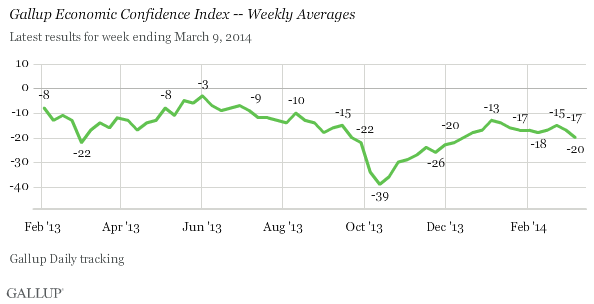The Tea Party's defeat of Cantor wasn't a political earthquake. It was a death rattle.
The long-term trends for the movement still look bad

A free daily email with the biggest news stories of the day – and the best features from TheWeek.com
You are now subscribed
Your newsletter sign-up was successful
The government shutdown in October last year was pretty gloomy for economic confidence. Gallup's economic confidence index fell to a dire -39 during the shutdown, the lowest it had been since 2011, although happily it bounced back pretty quickly once House Republicans yielded and raised the debt ceiling:

[Gallup]
But now with the victory of Tea Party-backed economics professor Dave Brat over House Majority Leader Eric Cantor earlier this week, many are wondering whether a resurgent Tea Party will spell more obstructionism.
The Week
Escape your echo chamber. Get the facts behind the news, plus analysis from multiple perspectives.

Sign up for The Week's Free Newsletters
From our morning news briefing to a weekly Good News Newsletter, get the best of The Week delivered directly to your inbox.
From our morning news briefing to a weekly Good News Newsletter, get the best of The Week delivered directly to your inbox.
The Week's own Paul Brandus argues:
[I]f you think Barack Obama has trouble dealing with House Republicans now, you haven't seen anything yet. Not only is the GOP favored to pick up an additional five to eight House seats in November — adding to its 233-199 majority (there are three current vacancies) — it could also pick up four to eight more Senate seats. A gain of six would give the Republicans a majority. Believe it or not, the next Congress could be even more obstructionist than it is now. [The Week]
That means that more government shutdowns — over ObamaCare, federal spending, or immigration reform — in Obama's final two years in office are a very real threat. While the last shutdown didn't last long enough to result in a recession or a default on government debt, the Tea Party may feel emboldened to push things further this time.
They shouldn't.
While the Tea Party might be able to mobilize its base to great effect in gerrymandered Congressional districts, the country as a whole isn't buying their message. Only 22 percent of Americans said they supported the Tea Party in May, the lowest number since the movement started in 2009, according to Gallup. Even Republicans are losing their taste for the movement, with just 41 percent of Republicans and Republican leaners claiming to support it.
A free daily email with the biggest news stories of the day – and the best features from TheWeek.com
Meanwhile, Americans are becoming more liberal on a host of issues. And the entry of the millennial generation into the electorate is fueling that shift. In 2010, Pew found that two-thirds of millennials favored a larger government with more services over a cheaper one with fewer services. And while large majorities of older and middle-aged Americans favored repealing the Affordable Care Act in late 2012, millennials favored expanding it, by 17 points.
Now, self-identified conservatives still outnumber self-identified liberals, but the gap is narrowing. Republicans and the Tea Party aren't going to be able to win forever by pushing harder to the right. In the more liberal country that America is becoming, the Tea Party's political menu of Know-Nothing anti-immigrant fervor, continuous re-investigations into Benghazi, government shutdowns, Voter ID laws, and Ayn Rand fetishism will appeal to a smaller and smaller base.
Of course, a Republican victory in 2014 doesn't require Republicans to win a majority of the national electorate. Thanks to gerrymandering and the structure of American democracy, the Republicans can win even while getting less votes. That's what happened in 2012. In the House election that year, Republicans took 58,228,253 votes, while Democrats took 59,645,531 votes. Yet Republicans took 234 seats to the Democrats' 201.
But in the long run, this is surely electoral suicide. Tea Party-supporters are largely over the age of 45, with many over the age of 65. While thousands of millennials are joining the electorate every day, a majority of Tea Partiers are reaching the age where they'll soon be leaving it. Perhaps millennials' views will change as they grow older, but if I was a Republican strategist, I wouldn't count on it.
John Aziz is the economics and business correspondent at TheWeek.com. He is also an associate editor at Pieria.co.uk. Previously his work has appeared on Business Insider, Zero Hedge, and Noahpinion.
-
 How the FCC’s ‘equal time’ rule works
How the FCC’s ‘equal time’ rule worksIn the Spotlight The law is at the heart of the Colbert-CBS conflict
-
 What is the endgame in the DHS shutdown?
What is the endgame in the DHS shutdown?Today’s Big Question Democrats want to rein in ICE’s immigration crackdown
-
 ‘Poor time management isn’t just an inconvenience’
‘Poor time management isn’t just an inconvenience’Instant Opinion Opinion, comment and editorials of the day
-
 The billionaires’ wealth tax: a catastrophe for California?
The billionaires’ wealth tax: a catastrophe for California?Talking Point Peter Thiel and Larry Page preparing to change state residency
-
 Bari Weiss’ ‘60 Minutes’ scandal is about more than one report
Bari Weiss’ ‘60 Minutes’ scandal is about more than one reportIN THE SPOTLIGHT By blocking an approved segment on a controversial prison holding US deportees in El Salvador, the editor-in-chief of CBS News has become the main story
-
 Has Zohran Mamdani shown the Democrats how to win again?
Has Zohran Mamdani shown the Democrats how to win again?Today’s Big Question New York City mayoral election touted as victory for left-wing populists but moderate centrist wins elsewhere present more complex path for Democratic Party
-
 Millions turn out for anti-Trump ‘No Kings’ rallies
Millions turn out for anti-Trump ‘No Kings’ ralliesSpeed Read An estimated 7 million people participated, 2 million more than at the first ‘No Kings’ protest in June
-
 Ghislaine Maxwell: angling for a Trump pardon
Ghislaine Maxwell: angling for a Trump pardonTalking Point Convicted sex trafficker's testimony could shed new light on president's links to Jeffrey Epstein
-
 The last words and final moments of 40 presidents
The last words and final moments of 40 presidentsThe Explainer Some are eloquent quotes worthy of the holders of the highest office in the nation, and others... aren't
-
 The JFK files: the truth at last?
The JFK files: the truth at last?In The Spotlight More than 64,000 previously classified documents relating the 1963 assassination of John F. Kennedy have been released by the Trump administration
-
 'Seriously, not literally': how should the world take Donald Trump?
'Seriously, not literally': how should the world take Donald Trump?Today's big question White House rhetoric and reality look likely to become increasingly blurred